
Publisher:
Bonnie King
CONTACT:
Newsroom@Salem-news.com
Advertising:
Adsales@Salem-news.com

~Truth~
~Justice~
~Peace~
TJP
Jul-07-2010 19:10

 TweetFollow @OregonNews
TweetFollow @OregonNews
Special Report - A Mexican Political Era Ends
Salem-News.comLooking past the short-term political scorecard, unsettling and ominous trends resurfaced or strengthened in the July 4 elections that seriously call into the question the future of democracy in Mexico.
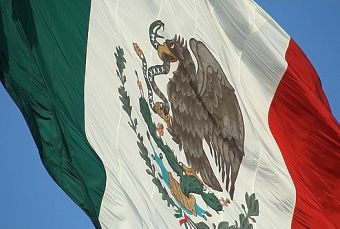 Photo courtesy: Exparta Palma |
(LAS CRUCES, N.M.) - On July 4, while oil continued to pour out of British Petroleum’s crippled well in the Gulf of Mexico and spread its contamination to new shores, a rupture of political sorts was consummated in Mexico.
In state and local elections, Mexicans ended one political era, sowed the seeds for the possible rebirth of an old one and cast new doubts about the future of a fresh one. Winning nine of twelve governorships up for grabs, the former ruling Institutional Revolutionary Party (PRI), continued its march to recapture the presidency in 2012.
Also winning many state legislative and municipal elections, the PRI emerged in local control of political territories astride the southern and northern borders, where in addition to legally sanctioned commerce, contraband of all sorts flows-in both directions.
In the north, the old party that was born from the 1910 Mexican Revolution won easily in the state of Tamaulipas, where its assassinated gubernatorial candidate was replaced by his brother on the eve of the election; in Chihuahua, where extreme violence also preceded the election; and in in Baja California, where the PRI swept the major municipalities of Tijuana, Ensenada, Playas de Rosarito, Tecate and Mexicali, the state governorship and the local legislature.


The Baja election ended more than two decades of dominance by President Felipe Calderon’s National Action Party (PAN) and reduced the party to a minority presence in one of its former strongholds, thus reviving the regional hegemony of the PRI which singularly ruled Baja and Mexico prior to the 1980s. The decline of the PAN was confirmed with stinging defeats in Chihuahua and Tamaulipas, as well as in another longtime bastion, the central state of Aguascalientes. Topping off its northern sweep, the PRI recovered the Chihuahua municipalities of Parral, Chihuahua and Nuevo Casas Grandes from the PAN. All three cities have witnessed high degrees of narco-violence in recent months.
July 4, said PRI President Beatriz Paredes, confirmed her party as “the first political force in the country.” Still, the PRI lost key political fiefdoms in Sinaloa, Puebla and Oaxaca, as unusual right-left political coalitions encompassing the PAN, PRD, Convergencia and PT parties delivered dramatic knockouts.
The PRI’s trio of debacles, contended Convergencia President Luis Walton, proved the party was not “invincible.”
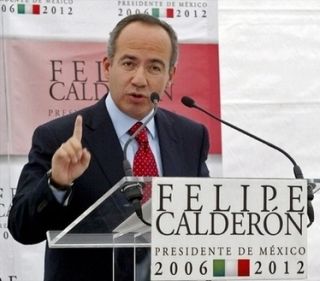
President Calderon defined the election as a vote for “peace” and against the violence of organized crime, but the factors driving the contest were far more complex and multi-dimensional.
Especially in Puebla and Oaxaca, the PRI’s losses likely had more to do with popular disgust at outgoing PRI governors Mario Marin of Puebla and Ulises Ruiz of Oaxaca than with any great love for the victorious parties.
Separately, the PAN and the center-left PRD, both of which experienced internal rifts, suffered serious setbacks, with the latter losing to the PRI the central state of Zacatecas which it had governed for the past 12 years.
It’s unclear whether the winning anti-PRI coalition candidates will institute governments that represent any real break with the past. The three victors, Mario Lopez Valdez (Sinaloa), Rafael Moreno Valle (Puebla) and Gabino Cue (Oaxaca) have political histories tied to the PRI or the traditional political class.
Although President Calderon quickly congratulated 11 of the 12 announced winners in the gubernatorial races, post-election conflicts shaped up in Veracruz, Durango and Hidalgo. On July 5, the home of Panista Alejandro Torrugo Vera, presumed winner of the mayoralty of Agua Dulce, Veracruz, was riddled by gunfire; no injuries were reported.
Electoral Legacies
 Map of Baja California |
Looking past the short-term political scorecard, unsettling and ominous trends resurfaced or strengthened in the July 4 elections that seriously call into the question the future of democracy in Mexico.
Particularly in the violence-ridden northern border region, abstentionism was the real winner. The preliminary results showed that the percentage of registered voters not casting ballots reached nearly 70 percent in Baja California, about 64 percent in Chihuahua and almost 60 percent in Tamaulipas, an entity which was struck by flooding from Hurricane Alex only days before the voting.
In Baja California, the dismal voter turn-out followed a decade-long trend. Participation dropped from 36.72 percent of the electorate in 2001 (40.59 percent in 2004) to 31.7 percent in 2010.
On the other hand, voter participation was higher and even officially exceeded 50 or 60 percent in several states where highly competitive races took place, including Sinaloa, Zacatecas, Durango and Veracruz.
“We have witness the election with the greatest historic participation,” proclaimed Fidel Herrera, the PRI governor of Veracruz. “In summation, it speaks about more than three million votes.”
In embattled Ciudad Juarez, usually a major destination for migrants from Veracruz, a paltry 20 percent of voters went to the polls. While certainly conveying popular angst with the political class, the low number could also reflect the depopulation of a city which in the aftermath of narco-violence and economic crash has reportedly sent tens of thousands fleeing to El Paso, Texas, as well as back to Veracruz and other Mexican entities.
The border city will once again be governed by the PRI’s Hector “Teto” Murguia, whose 2004-2007 administration immediately preceded Ciudad Juarez’s descent into unprecedented violence.
Widely blamed on organized criminal groups attempting to manipulate election outcomes, violence was a common denominator in many state elections. The murder of PRI gubernatorial candidate Rodolfo Torre in Tamaulipas days before the election attracted the most media attention, but scattered bouts of violence continued well into election day.
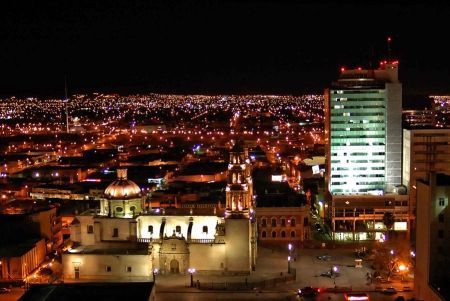 Chihuahua City, Mexico Courtesy: skyscrapercity.com |
Outgoing Chihuahua Governor Jose Reyes Baeza denied any link between the elections and violence, but July 4 started out on a macabre note in his state.
In an almost-apocalyptic scene, Chihuahua City awoke to the hangings of four men from overpasses located in strategic intersections of the state capital. Juan Scott, the chief of guards at a nearby state prison was among the victims.
Later, the bodies of six men were found executed on the Chihuahua-Delicias highway. Up the old Royal Highway in Ciudad Juarez, at least 13 people were reported murdered on July 4. The previous day, at least 15 people were reported killed in Ciudad Juarez.
In the Chihuahua mountains, meanwhile, Trinidad Pacheco Diaz, brother of the PAN candidate for mayor of the town Batopilas, was found slain.
Among other election day incidents tallied elsewhere, a shoot-out erupted over a ballot dispute in the state of Hidalgo, and a leader of the UNORCA small farmers’ organization in Chiapas, Francisco Giron Luna, was shot to death.
Chiapas state police have detained four men in connection with the crime.
Yet another disturbing trend consisted of the widespread reemergence of old-style election tricks and irregularities that have been so heavily criticized in the past. These included outright vote-buying, conditioning the delivery of social services in return for votes, ballot box stuffing or stealing, and negative campaigning.
By July 4, the federal attorney general’s special anti-election crime unit (Fepade) had opened 23 preliminary investigations and compiled 113 reports on alleged electoral crimes. In Durango, two employees of the state attorney general’s office were detained by federal officers July 6 while in the possession of three allegedly stolen ballot boxes. The materials were among 35 ballot boxes reportedly heisted by armed men in the cities of Durango and Gomez Palacio on election day.
In a campaign year marked by scandal, violence and mudslinging, the elections were largely devoid of real debate over important issues, according to political analyst Jenaro Villamil.
“The entire political class has confused alternating power with democracy….” Villamil contended. “Almost all of them seem to have contracted the same marketing, smiling the same way in front of Photoshop or the big screen. They crafted the campaigns to empty them of any content.”
The Meaning of July 4
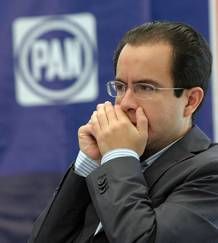 Cesar Nava, president of the PAN |
Mexicans from the right, center and left quickly put their spin on the meaning of July 4. A buoyant Cesar Nava, president of the PAN, proclaimed his party would go-it-alone in the 2012 presidential election. Former 2006 presidential candidate and left opposition leader Andres Manuel Lopez Obrador, who still commands a large national organization, declared social injustice, corruption and other ills would persist without a change at the national level.
Mexico City PRD Mayor Marcelo Ebrard, who was an important ally of Lopez Obrador in 2006 but is now viewed as a possible presidential candidate in 2012, maintained the elections unfolded in a largely peaceful manner and upheld the democratic principle of alternating power.
Enrique Carlos Blancas de la Cruz, president of the Baja California Institute of Electoral and Citizen Participation, said the low level of voter turn-out signaled the need for a renewed push from the state, political parties and civil society to restore democratic life.
Proceso columnist Jesus Cantu argued that a genuinely fair election was impossible in Tamaulipas because of press suppression, narco threats against candidates and the inability of political parties to freely campaign and reach the public. Cantu concluded that “none” of the “minimal” requirements for democratic elections existed in Tamaulipas.
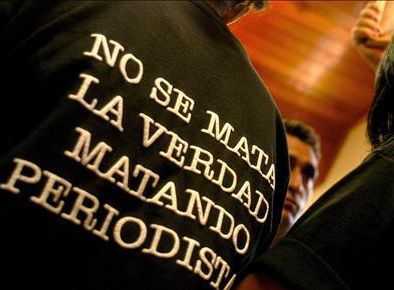 Translates to: Killing a Journalist - is Not Killing The Truth |
Recalling several instances in which candidates were murdered or threatened, Cantu also mentioned the effective silencing of the local press in recent years. Citing the Latin American Federation of Journalists and Journalists On Line, Cantu said that at least ten journalists have been murdered and seven others disappeared during the last decade. Scores of others have been violently attacked or threatened. “Freedom of the press does not exist in Tamaulipas,” Cantu wrote.
According to the Mexican press advocacy organization CEPET, six journalists have been murdered in Mexico this year so far-four in Guerrero, one in Coahuila and one in Michoacan. Like Tamaulipas, all the states where journalists have been killed in 2010 are hotspots of organized crime disputes.
One of the harshest assessments of July 4 was penned by national columnist Sergio Sarmiento. “The enthusiasm and desires for changing the country that we saw in the campaigns of Cuauhtemoc Cardenas in 1988, Diego Fernandez de Cevallos in 1994, Vicente Fox in 2000 and Andres Manuel Lopez Obrador in 2006 have gone away,” Sarmiento wrote.
“Paradoxically, the absence of the Mexicans at the polls is facilitating the return of the hegemonic(PRI) party...a country where the public is not interested in politics, and where the politicians and narcos divide up the spoils of power, simply has no future.”
Sources:
- La Jornada, July 3, 4, 5, 6, 7, 2010. Articles by Antonio Heras, Ciro Perez Silva, Andres T. Morales, Miroslava Breach, Ruben Villalpando, Matilde Perez, Elio Hernandez, Notimex and editorial staff.
- Frontera, July 5, 2010.
- Univision, July 4 and 5, 2010.
- Lapolaka.com, June 30, 2010; July 4, 2010.
- El Diario de Juarez, July 3, 4 and 5, 2010. Articles by Miguel Angel Granados Chapa, Sergio Sarmiento, El Universal and editorial staff.
- Proceso/Apro, July 4, 5 and 6, 2010. Articles by Carlos Acosta Cordova, Jesus Cantu, Alvaro Delgado, Pedro Zamora Briseno, Jenaro Villamil, Notimex and editorial staff.
- El Sur/Agencia Reforma, July 1 and 5, 2010. Articles by Emmanuel Salazar, Zacarias Cervantes and editorial staff.
- El Universal, June 29, 2010; July 1, 4 and 5, 2010. Articles by Carlos Loret de Mola, Denise Maerker, Notimex, and editorial staff.
- CEPET. July 6, 2010.
- Press statement.
Frontera NorteSur (FNS): on-line, U.S.-Mexico border news Center for Latin American and Border Studies New Mexico State University Las Cruces, New Mexico
Articles for July 6, 2010 | Articles for July 7, 2010 | Articles for July 8, 2010



googlec507860f6901db00.html


Terms of Service | Privacy Policy
All comments and messages are approved by people and self promotional links or unacceptable comments are denied.
[Return to Top]
©2026 Salem-News.com. All opinions expressed in this article are those of the author and do not necessarily reflect those of Salem-News.com.